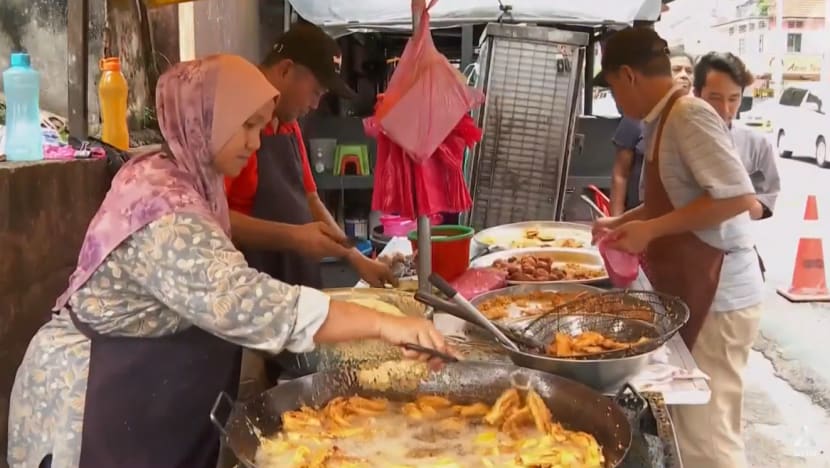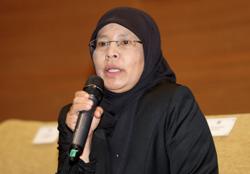
KUALA LUMPUR: Housewife Rini Sarbit lives in a low-cost housing area on the fringes of Kuala Lumpur.
The mother of two has been selling homemade snacks in her neighbourhood to make ends meet because her husband’s meagre salary as a railway worker is not enough to support the family, she told CNA.
“Our salaries are not keeping pace with skyrocketing prices,” she said.
Although the government has spent billions of dollars in food subsidies on daily essentials such as rice and cooking oil, getting them is not always easy.
"Sometimes we can find it (subsidised oil packets) and sometimes, it's sold out. Nowadays, rice is expensive and sometimes we can't find eggs,” said Ms Rini.
Mr Yunas Saruji and his wife, who sell banana fritters near Ms Rini, shared similar complaints.
"We can only buy two (oil packets). That's why we resort to bottled oil that costs RM29 (US$6) for a 5kg bottle,” he said.
In comparison, a packet of subsidised oil costs US$0.50 per kg. The government has said 60 million packets of subsidised oil are released into the market every month. But they run out quickly because anyone regardless of their household income can buy them.
Malaysian Prime Minister Anwar Ibrahim, who will be tabling Budget 2024 in parliament on Friday (Oct 13), is expected to announce details on subsidy rationalisation to better help those in the lower-income group like Ms Rini and Mr Yunas without neglecting middle-income earners.
In a recent interview with CNA, Mr Anwar, who is also finance minister, said the current subsidy programme that ran up to US$17 billion last year is plagued by leakage and wastage and is not sustainable.
Half of fuel subsidies are said to benefit the rich.
“The country cannot continue with this total dependence on obsolete policies of just giving handouts, subsidies which are no longer tenable,” he said.
He has tasked Minister of Economic Affairs Rafizi Ramli to develop a mega database with real-time information from multiple agencies profiling about 10 million households.
The system, known as PADU, is expected to be ready in January and will provide a basis for targeted subsidy rollout with consideration of factors like combined income, household size, locality and the distance to work and school.
PEOPLE WANT “QUICK WINS”
However, it remains to be seen if Mr Anwar’s administration has the capacity and political will to see it through.
"The problem is that people want quick wins. These reforms might take some time. If you're going to do targeted subsidies and GST (goods and services tax), on the fiscal consolidation side, the cost of living might actually increase over the short term,” said CEO of public policy think tank Institute for Democracy and Economic Affairs Tricia Yeoh.
“The government is in a little bit of a bind because the concern is the Malay community will actually be very quickly won over by the critique (of) PN and PAS as opposition,” she added.
While the government has no immediate plan to reintroduce the goods and services tax, it is committed to achieving the target of reducing the fiscal deficit to 3.5 per cent of gross domestic product by the end of 2025.
PROGRESSIVE WAGE POLICY
The government is also expected to announce another move to improve the plight of its people - a progressive wage policy which could take effect as early as next year.
This comes as it looks to cut foreign labour, which it has depended on for decades, to within 15 per cent of its workforce by 2030.
The over-reliance on unskilled foreign workers in sectors like construction, plantation and manufacturing, is one reason wages remain low in the country.
However, the road ahead appears long.
"The figure (on foreign workers) we have now is quite scary. So we got to do something about it. At the moment we have more than 2.5 million (foreign workers). We have to control it because until 2025, we are only supposed to have 2.4 million,” said Malaysian Human Resources Minister V Sivakumar.
“At the same time there's still a lot of demand out there, it's not easy for us to manage this.”
Employers see foreign workers as cheaper to hire and more compliant, but economist Noor Azlan Ghazali said that it is time to transform the jobs to make them more attractive to locals.
"If it's dirty, turn it clean, if it’s dangerous make it safe, if it's difficult make it easy, technology can resolve this,” said Dr Azlan, director of the Malaysian Inclusive Development and Advancement Institute,at the National university of Malaysia UKM adding that bringing in foreign workers will flood the labour market.
In seven years, the government plans to double the median income of Malaysians, which is currently less than US$500.
https://www.channelnewsasia.com/asi...our-progressive-pay-policy-investment-3840756
















